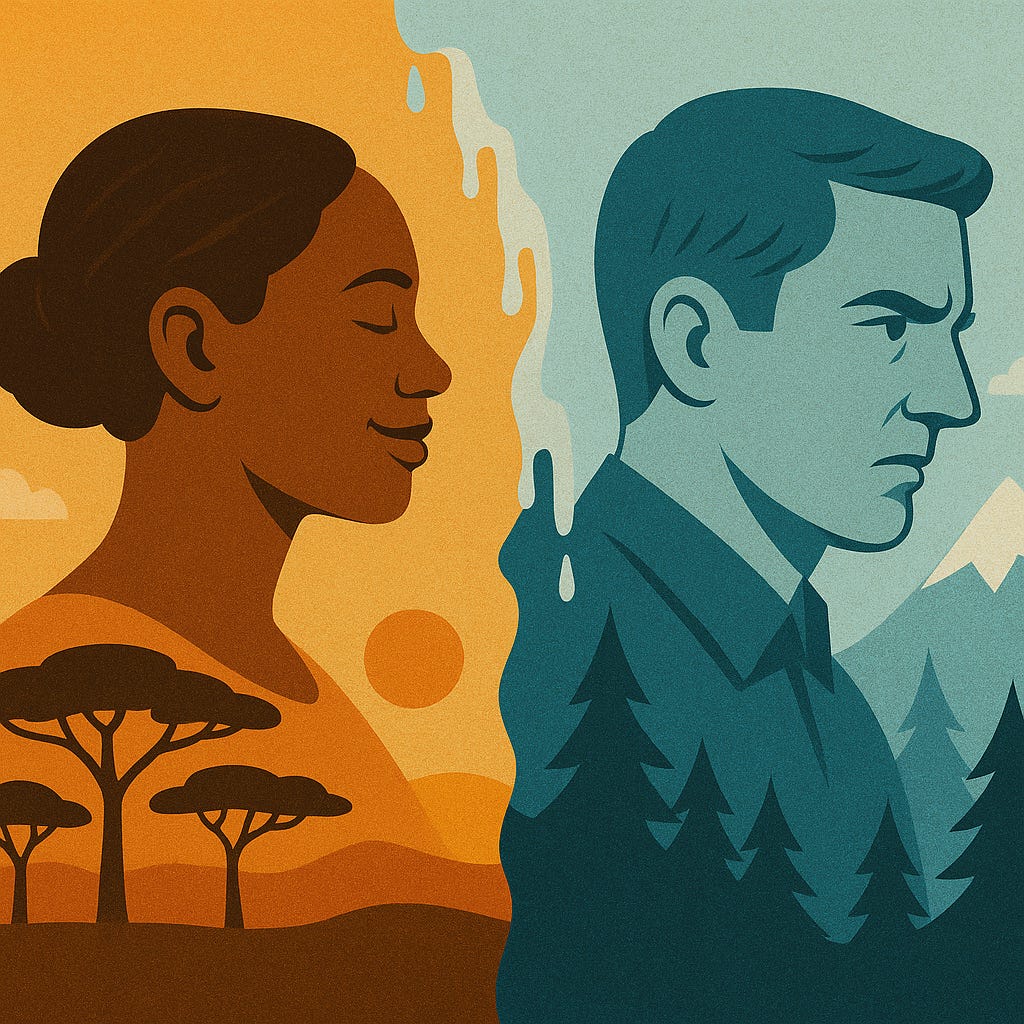Climate, Culture, and Cooperation: How Warmth Shaped Worldviews
Why Africa and the tropics hold forgotten answers in an overheating world.
“She’s warm-hearted.”
“He’s cold and calculating.”
We don’t just describe people by their moods. We tell them by their climates.
It’s not a coincidence. Our language is a mirror of our reality — and weather, quite literally, weathers us. The environments we grow up in don’t just shape our crops and clothing — they shape our character, our cultures, and even our moral instincts.
Warmth Encourages Trust
In regions blessed with temperate or tropical climates — like most of Africa — people didn’t have to plan for six months of snow or build bunkers against blizzards. So it’s no coincidence that Africans find it difficult to plan aeons ahead; it’s not in our climate, and it’s not in our blood. The earth was generous, the seasons relatively stable, and nature predictable. Even in the harshest of times, the motherland always made provision.
What did that do to the psyche?
It created trust — in the land, in time, in each other.
You didn’t need to hoard — you could always share.
You didn’t need to build vast reserves — the mango tree would fruit again.
You didn’t need to fear the stranger — they were just another set of hands around the fire.
In short, the climate allowed cultures to prioritize cooperation over competition, community over control, and presence over panic.
Cold Cultivates Control
In colder, harsher climates, survival requires a different logic.
You have to store.
You have to plan ahead.
You have to defend what little you have from those who might take it.
Scarcity trained people to think in terms of ownership, boundaries, and fear (even their animals know this; casual reading on how bears prepare for hibernation will give you perspective, that’s if the fact that the animal knows to go into hiding isn’t convincing by itself). Not because they were cruel — but because they were cold. And coldness, repeated over generations, becomes not just a survival tactic — but a worldview.
It becomes a personality.
It becomes a culture.
And over time, it becomes law.
Repetition Becomes Reality
Human beings are masters of adaptation. Give us a pattern — and we will repeat it. Repeat it long enough — and we will believe it is truth.
So it didn’t matter if someone from a cold climate migrated to warmer lands — the behaviour had already taken root:
Protect.
Accumulate.
Control.
Compete.
These aren’t just habits. They’re internalized survival scripts — and once installed, they run on autopilot.
Even in a world that no longer requires them.
The World Is Getting Hotter — And Truths Are Melting
Enter: climate change.
The world is warming — but so far, it’s only revealed how cold our systems truly are. For those cultured by the cold, it’s defensive strategies; it’s protecting what you have; it’s war.
As crops fail, some hoard.
As seas rise, some build walls.
As forests burn, some sell more fossil fuel.
But nature is forcing a conversation. Not just about carbon, but also about culture.
Because our climate isn’t the only thing that needs to change — our climate-conditioned behaviours do too.
Why Africa — and the Tropics — Have the Answers
African societies, shaped by warmth, developed traditions that didn’t just fit their environment — they respected it.
Communities shared resources because they could — and because it made life richer.
Conflict resolution emphasized restoration, not punishment.
Leadership wasn’t about command, but about connection.
Wealth wasn’t what you had — but how many people you could count on.
These aren’t just nostalgic memories of precolonial life — they’re living models of climate-aligned wisdom. And as the global temperature rises, the old cold logics are cracking.
Toward a New Warmth
To survive what’s coming, the world needs more than technology. It needs temperament.
It needs the warmth of:
Empathy over efficiency
Mutuality over mastery
Reverence over resource extraction
The climate has always shaped the culture.
But now, culture must shape the climate response.
Africa — and the tropics at large — aren’t behind.
They’re the blueprint for a future that’s already here.


